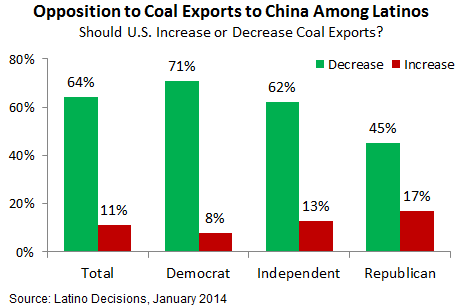New research released today by Latino Decisions and the Latino Policy Coalition finds that Latino voters oppose new efforts to export US coal to China and Asia from the West Coast.
As Matt Barreto, co-founder of Latino Decisions and Associate Professor of Political Science and adjunct Professor of Law at the University of Washington reports, a clear majority of Latino voters rejects plans underway to expand coal exports through western cities and ports, by a margin of roughly 6-to-1.
As Latino Decisions senior analyst, Adrian Pantoja, points out, the findings affirm strong green attitudes about climate change and pollution among Latino voters revealed in national polling in the past few years, including a 2013 survey in which Latino Decisions found that 84 percent of Latinos favor the EPA setting more strict air pollution safeguards and 86 percent would support the President using his executive authority to set promote rules that limit carbon pollution. The results also reflect Latino voters’ attitudes about coal as a dirty fuel of the past, harmful to communities, food, kids, and health.
Barreto writes:
The findings from today’s poll release confirm Latinos general support for environmental protection and opposition to carbon pollution. In fact, this is the first poll to question Latinos on the specific topic of coal exports to China, and comes at a time when the US government grapples with coal export policy in the West.
Overall, 64 percent of Latinos say the amount of coal exported to China should be decreased compared to just 11 percent who thought it should be increased. Opposition to coal exports were consistent across party affiliation.

Asked specifically, Latino voters said, by a 2-to-1 margin, they would support a new export policy to curb the shipment of coal from the US to China and other Asian markets from West Coast ports. Overall 59 percent of Latino voters said they would support new policies to stop coal exports to China and just 27 percent said they would oppose such a policy.
How do Latino voters’ attitudes compare to the general population in the region? It’s a little hard to say since not much recent polling has been conducted.
Polling in 2012 showed fairly robust opposition to coal exports among BC voters, though many British Columbians hadn’t then heard much about plans to export US coal through BC ports.
A 2012 survey of Oregon voters found that 46 percent favored exporting US coal from ports in Oregon while 31 percent opposed it. There was stronger support outside of the Portland Metro and Willamette Valley areas. (The strongest support for the export plans was from male Republicans.)
A year ago, Washington State residents showed tepid support for coal exports, with 55 percent supporting the idea and 27 percent opposed. As EarthFix’s Amelia Templeton pointed out, the report indicated that “most respondents could be considered ‘persuadable’ on this issue. Just 43 percent said they were decided (24 percent definitely for and 19 percent definitely against). Most respondents (58 percent) were only ‘inclined’ one way or the other (26 percent to support, 13 percent to oppose) or undecided (19 percent).”
At the time, Stuart Elway, the president of Elway Research, told EarthFix that with with almost 6 out of 10 respondents saying their opinions aren’t firm on the coal export issue, “that suggests that there’s a more lively debate ahead than we’ve had thus far.”
A lively debate ensued and attitudes may have indeed changed—or calcified. In any case, given the track record, it’s not hard to imagine that Latino voters’ opposition outpaces the general population.


Comments are closed.